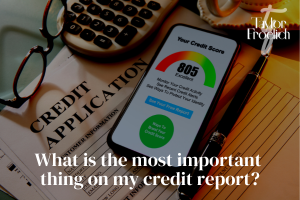What is the most important thing on my Credit Report?
The dreaded credit report. It can be confusing and overwhelming, but it greatly affects your borrowing power. So, let’s dive in and clarify some details for you so you can get in control of your credit score and set yourself up for success.
What is a credit report score, anyway?
A credit score is a three-digit number that creditors use to determine your trustworthiness as a borrower. It serves to provide valuable information to lenders on your history of paying money back on time. This score (300-850) is calculated through multiple factors and reported by three primary credit bureaus: Experian, Transunion and Equifax.
What factors make a difference in my credit report?
A handful of factors play roles in determining your credit score. They carry different weights as far as impact goes, but all of these factors should be considered.
Payment History (35%): This is your account payment history on previous and present accounts, including those on public records. Late or delinquent payments will immediately lower your score. One late payment, overdue by 30 days, can lower your credit score by more than 60 points.
Amounts Owed (30%): This is how much you owe on your accounts. The amount of available credit you regularly use on credit cards (revolving accounts) is a big one. For the best score in this category, the rule is to keep the overall use of your available credit below 30%.
Age of Accounts (15%): This is the length of time your accounts have been open and active. Lenders and creditors like to see experience in this category. Many new accounts do not hold as much weight as long-standing accounts.
Types of Credit (10%): This is the variety of accounts you have open and regularly use. Revolving accounts, such as credit cards and installment credit accounts, such as a mortgage or auto loan, typically comprise this category.
New Credit (10%): This category includes all new credit inquiries and recently opened accounts. You should aim to keep this category to as few as possible.
These are the basics of what goes into your credit score, which can help decide what accounts to consider. If you are starting to build your credit, want to maintain a healthy score or are looking to repair past mistakes, these are good factors to know. I will continue to provide resources to help you on the DIY path, but I am also available to answer questions. So, if you are actively looking to learn more, reach out!
Keep watch on the blog; new posts are coming soon. Is there a topic you would like to hear more about, send me an email and let me know!
This article was originally published in April 2022 and has been recently updated.
